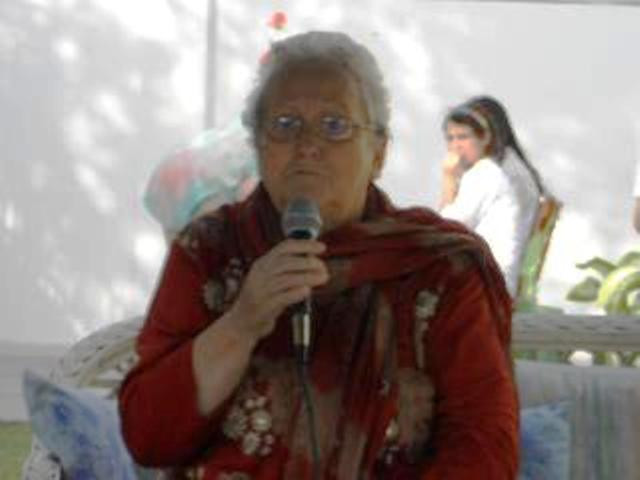Sister Jeanine came out here at the age of 21, three days after her birthday, originally planned to be here for only three years, and has stayed on ever since.
A short woman with close-cropped hair and remarkably clear skin and eyes, she's determined and hard-working, speaks better Urdu than me, and wears a shalwar kameez. She lives in Manghopir and looks after the MALC school for the children of leprosy patients, oversees the embroidery and other crafts made by the patients, and has helped thousands of people be cured of the disease.
I asked Sister Jeanine if she'd lived in any other country before coming to Pakistan.
"No, only Belgium. Then I heard of Father Damien, who had come out to Pakistan to help with the lepers, but he contracted the disease and later died of it himself. My mother was very worried about me, thinking that I'd catch leprosy, but she said it was my decision if I wanted to come. Still, she didn't let me come out here until I was 21! So, three days after my birthday, I was in Pakistan."
"Did you fall in love with the country, the people, or the work?" I asked her.
"The work, I think. I like to be useful and to feel needed."
"And do you have any problems with people from the mosque, say, coming around and saying you shouldn't be here because you're Christian, or a missionary?"
"No, no," said Sister Jeanine, waving off my question with her hand. "Nothing like that, not at all."
She related how at one point, some people objected to the MALC school being co-educational.
"So I said, fine, I am a lady, I will keep the girls with me, and you take the boys elsewhere. So they all said, nahin, nahin, aisa hi rehne do (let it stay the way it is)," she chuckled.
"So what are the challenges that you faced in your work?" asked Muna Bilgrami, who was hosting the tea.
"Well, to convince people to take the medicine, and to take it regularly. At first they were ashamed to tell me they had leprosy. But now they come and say, 'Sister, I had a touch of leprosy, but I'm cured now.' The stigma of having leprosy is gone now, you see."
Then she chuckled again.
"Also, when I came here, I wore trousers and had short hair. People didn't believe I was a woman. So I decided to start wearing shalwar kameez. I thought fine, if it is what the people are more comfortable with. I like to see what the traditions are and stay within them..."
"And how is leprosy treated? With antibiotics?" I asked.
"No, there is a special medicine. It's not very expensive, and it only takes a year to cure, from the infectious stage. If you take the medicine regularly. You know, though, I had a lot of people asking me if the cloth that the patients embroidered to be sold in our shop was contaminated, could they get leprosy from touching it. I said no, the cloth is all boiled and sterilised, I see them do it myself, so there is no possibility..."
Sister Jeanine cited the work of Dr Ruth Pfau, who established the Marie Adelaide Leprosy Control Program for Pakistan in 1960.
[[http://www.youtube.com/watch?v=T3KzIWpXENc&feature=player_embedded]]
"She was very good. And we also have paramedics, male and female, who work with me."
She pointed out one of her workers, a thin man who was standing at the table where the embroidery was being sold.
"You see him, Naushad? His wife used to work with us, but she left to take care of the children, so he came on as our driver instead, and he is with us everywhere now. He is really very good, very helpful."
How many other foreigners do we have working out here in Pakistan, quietly and under the radar, purely for the sake of helping other human beings? They are our hidden treasures.
Bravo, Sister Jeanine! Pakistan is proud to call you one of our own.
Read more by Bina here, or follow her on Twitter @binashah



COMMENTS
Comments are moderated and generally will be posted if they are on-topic and not abusive.
For more information, please see our Comments FAQ